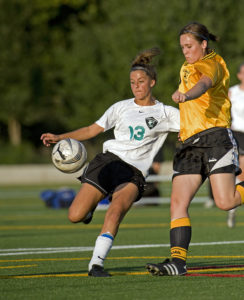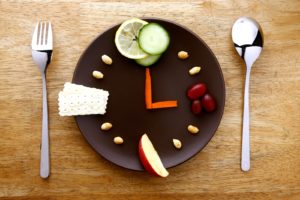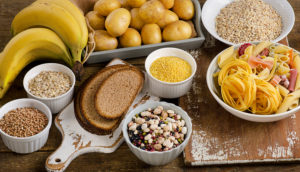Tips for Fueling High School Athletes
Tips for Fueling High School Athletes
Many high school athletes have dreams of playing in college or even making it to the big leagues. These dreams require hard work, dedication, support from family and friends and last but not least, a good FUELING STRATEGY! Athletes can train as hard as they want to but without a good performance plate an athlete will never reach their true potential.

Luckily, we are here to help. Here are 7 sports nutrition tips to fuel your body and build a healthy plate for your best high school athletic performance.
Begin with Breakfast
Start your day with a good meal containing complex carbohydrates, to provide you with energy throughout the day, and protein to keep you fuller loner and aid in muscle building. Some sources of complex carbohydrates include whole wheat toast, oatmeal, quinoa, buckwheat and sweet potatoes.
When choosing protein sources for breakfast, choose lean protein sources like eggs, roasted chicken, turkey sausage, tofu, Greek yogurt or skyr.
At home: Scrambled eggs (protein), roasted sweet potatoes (complex carbs) and blueberries (complex carbs)
TIP: Prepare sweet potatoes on the weekends to use all week. Scrub potatoes, cube and roast with olive oil, salt and pepper at 425 F for 20-30 minutes or until done. Store in the fridge for up to 5 days. Reheat as needed for breakfast, lunch or dinner.
On the go: Smoothie-to-go bended with almond milk (liquid base), silken tofu (protein), mixed berries (complex carbs) and frozen kale/spinach (complex carbs)
TIP: Place all smoothie ingredients in the blender carafe and store in the fridge overnight. In the morning, blend and serve in a glass with a lid and straw or shaker cup for ease of portability.
Load up at Lunch
Since high school athletes are already at a disadvantage due to school restrictions on eating times, it’s important to fuel up when they can. So, make lunch count with smart choices!
TIP: Whether you’re packing a lunch or eating a school meal, it should include a protein (chicken, fish or beans) and healthy carbohydrates like vegetables, fruits and whole grains.
Brown bag lunch: Pack a turkey (protein) sandwich on whole wheat bread (whole grains), hummus (complex carbs & healthy fats) and cucumber sticks (veggie) and strawberries (fruit)
School Meal: Choose the grilled chicken (protein) sandwich, milk (protein & carbs), green beans (veggie) and apple (fruit) instead of hamburger, French fries and juice.
Warm up with Water
Performance is negatively influenced by hydration. Even a 2% loss in total body water can negatively affect your performance. Sip on fluids throughout the day to ensure you are hydrated come practice or game time.
TIP: Bring a water bottle to school to sip on throughout the day. If your school does not allow this visit the water fountain between every class. Try to take at least 2-3 visits to the restroom during the school day.
Carbs = Fuel
In the world of sports nutrition, high quality carbohydrates are the MVP. Carbohydrates, like fruit, oats, quinoa, yogurt, rice, potatoes, vegetables and beans provide the main source of energy for your body and brain, allowing you to keep up your intensity during workouts and games. Plus, carbs aid in proper hydration by helping the body to hold onto water.
TIP: Your carb of choice should depend on its intended use. Fast acting, easy-to-digest carbohydrates like white bread/rice, pretzels, applesauce and sports drinks provide immediate energy and therefore, are best right before a game or a practice. Complex carbohydrates like beans and vegetables provide sustained energy, so should be consumed 2-4 hours before an event to provide adequate time for digestion.
Build with Protein
Protein is essential in building and maintaining muscles, aiding in recovery and supporting immunity. Protein intake should be spread throughout the day and be present at every meal and snack.
TIP: Choose lean protein sources to build strong muscles and support a healthy body. Protein sources include nut butters, hummus, beans, chicken, pork, fish, nuts, seeds, edamame, Greek yogurt, eggs and milk
Timing is Everything

The timing of when you eat is almost as important as what you eat. It is important that your body has adequate energy before an event and the necessary nutrients after the event to aid in recovery.
2-4 hours before: Focus on eating a balanced meal with lean protein, fruits and vegetables plus additional complex carbohydrates. This may be your lunch, so remember not to skip it!
30-60 minutes before: Try snacking on a small amount of familiar and easy-to-digest simple carbohydrates to top off your fuel tank before practice or game time.
30-60 minutes post workout: The “recovery window” closes quickly, so be sure to have a source of fluid, carbs and protein after your workout. Fluid replaces sweat, carbs replace glycogen (fast energy) and protein aids in rebuilding muscle.
TIP: A well-researched recovery snack is chocolate milk, which contains fluid, carbs and protein. Another option is a peanut butter sandwich and tart cherry juice.
Adjust your plate with your training
Many athletes know what to eat, but they do not know how to tailor their plate to their performance needs. Your nutrition strategy should adjust according to your training demands. On longer or harder training days, your performance plate should have more food, particularly from carbs, compared to lighter training days. Fluid needs will also increase with hotter weather. Learn more about building your winning performance plate here.
Try these tips to create your fueling strategy for the best high school performance!
Need help in finding the right nutrition strategy for you?
Learn more about our Youth Fueling Sports Nutrition services here.
Download our Ultimate Guide to Fueling Youth Athletes here:




